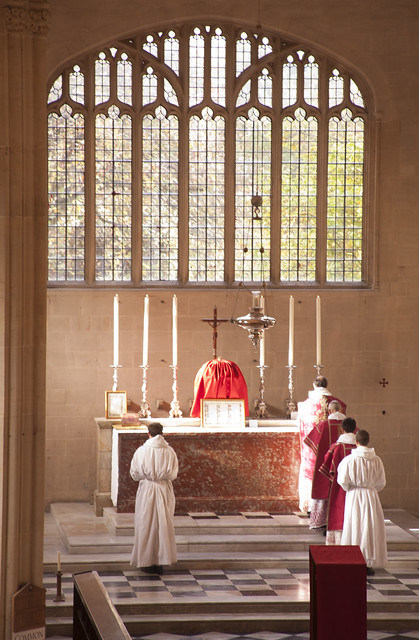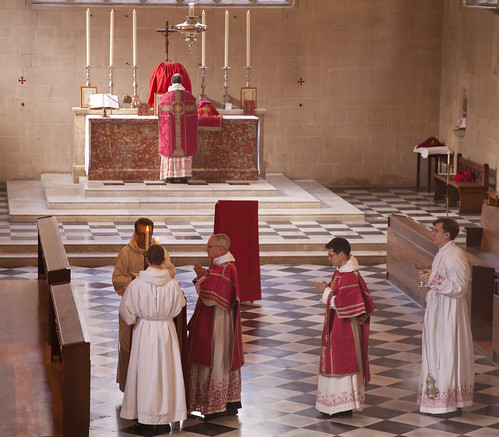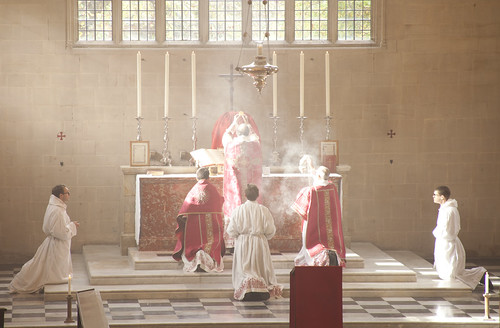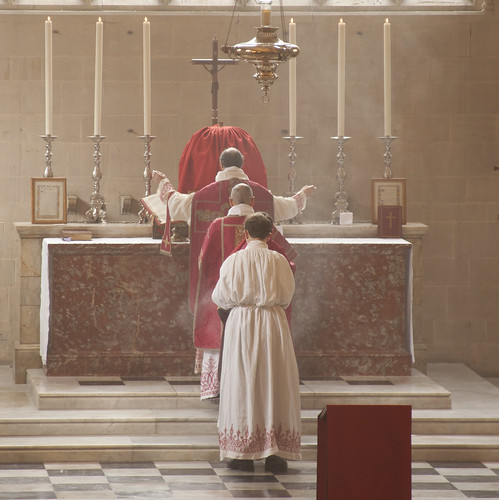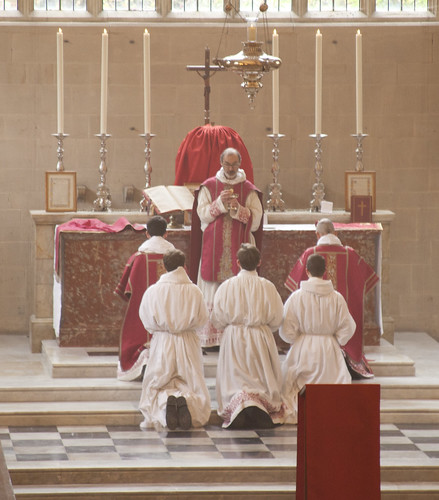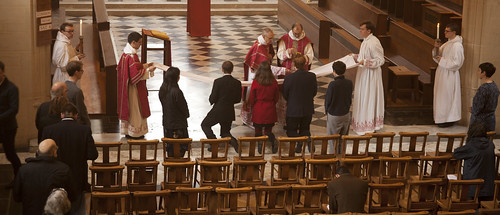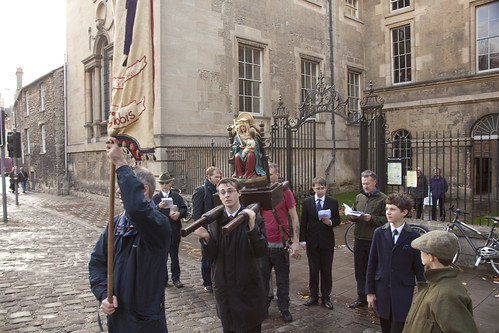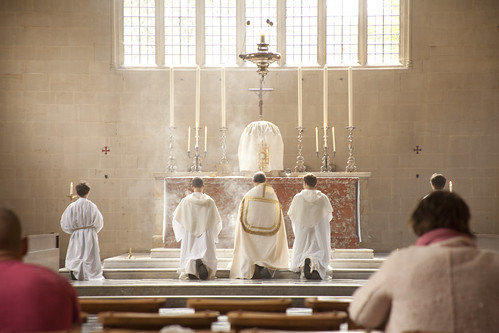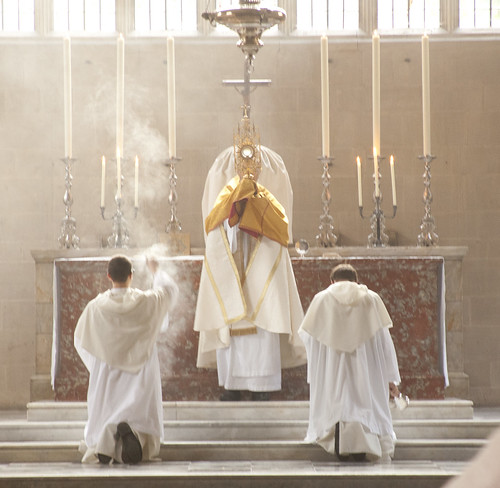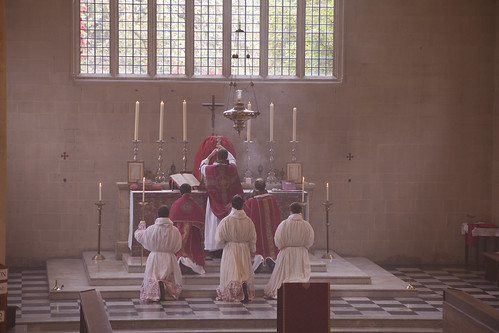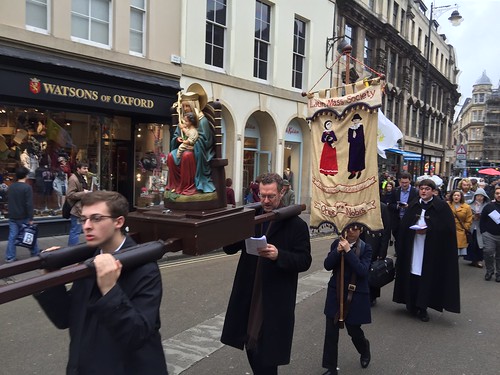Chairman's Blog
Remembrance Sunday
Remembrance Sunday, 12th November, is coming up in the UK: the Sunday nearest to the 11th of November, the date the First World War ended, when by longstanding permission priests in England and Wales are allowed to celebrate a Requiem Mass for our war dead.
There will be truly worthy sung celebrations of the ancient Mass for the Dead in the Birmingham Oratory, and in St William of York, Reading, with the Fraternity of St Peter.
Those locations are about 100 miles apart, or a two hour drive. Between them, the only place where you will find a Sung, Vetus Ordo Requiem Mass on Sunday will be in Holy Trinity, Hethe, at 12 noon (click for a map).
This is the oldest Catholic parish church in Oxfordshire, noted for the beauty of its decorations. Mass will be celebrated by Mgr Bruce Harbert, the well-known liturgical scholar, and the singing will be led by Dominic Bevan.
Please join us to pray for the war dead, some of whom are buried in the graveyard next to this church.
Support the work of the LMS by becoming an 'Anniversary Supporter'.
A renewed attack on celibacy?
Reposted from December 2015
-----------------------------------------
The word is out that the next subject for discussion at a Synod of Bishops will be celibacy. I don't know if this is true, but it is worth reminding ourselves of exactly why the Latin Church (as opposed to the Byzantine, Maronite etc. churches) should not abandon celibacy.
A while ago I wrote a short series of posts on the topic:
The Attack on Celibacy is an Attack on the Priesthood
The Attack on Celibacy is an Attack on Marriage
Here are a few points from those posts.
First, we have come to this stage in the debate because, in a series of choices between strengthening or weakening celibacy, the Church's leadership has chosen to weaken it. These decisions have been understandable - it is important to stress that, taken individually, they may seem inevitable, or even laudable - but the cumulative effect has been to erode the principle of priestly celibacy. Examples of such decisions have been: the giving way to the massive departure of priests from their vows, and the moral support given by bishops to laicised priests, including groups calling openly for the end of celibacy; the promotion of married deacons, and the endemic confusion about deacons' obligations; the taking over of various liturgical functions by lay people, including women; and concessions made to former Anglican (and occasionally Lutheran) convert clergy.
If celibacy is of value, and St John Paul II liked to stress that it is, then we need to treat as being valuable. There is a price involved in maintaining the ideal of celibacy, and if we are not prepared to pay the price, then it will disapear. Tough decisions, perhaps harsh decisions, will be necessary from future Popes and from bishops who want to preserve and promote celibacy, and not just give it lip-service and take it for granted while it withers away.
Second, the priesthood is undermined by attempts to lower its costliness: the visible cost paid by those entering the priesthood, which demonstrates publicly their committment to the priestly ideal. The Eastern churches do not simply make do without celibacy: they have a disciplinary regime, of fasting, and an obligation to lengthy liturgies, which few Western priests would put up with for a minute. Well, our Western priests don't have to put up with it; it is not our tradition. Our priests' conforming to Christ is manifested in a different way. What this means is that the example of the Eastern churches does not make the liberal point that celibacy is unimportant; it does the opposite. A priesthood without any onerous obligations, a slack priesthood, has no historical precedent, and would have no future.
Third, the idea that priesthood can without further ado be combined with marriage undermines marriage, because it implies that marriage itself is not a serious committment with serious implications for one's way of life. In the liberals' conception, marriage is reduced to the status of an occasional sexual outlet for incontinent men. If that's what they think marriage is, it is no wonder that marriage is in trouble. And it is in trouble: it is in the most desperate trouble in the West, in no shape to shore up another crisis-ridden institution.
Liberals have a habit of taking for granted whatever they aren't currently attacking. When attacking celibacy, they take marriage, and the priesthood itself, for granted: they assume that if we carry on taking away the supporting attitudes and practices which surround these things, life will go on as before. It hasn't, and it won't.
See also my post on 'Part Time Priests'
Support the work of the LMS by becoming an 'Anniversary Supporter'.
LMS Pilgrimage to the Holy Land
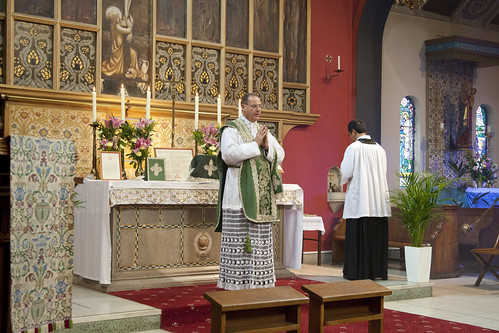 |
| Fr Martin Edwards celebrating Mass in his church of St Mary Magdalen, Wandsworth |
A 9-day pilgrimage with Traditional Masses at the Holy Sites
Fr Martin Edwards, Parish Priest of St Mary Magdalen’s Wandsworth, will be leading a pilgrimage to the Holy Land 10th-18th November 2017, with a daily Traditional Mass at the holy sites.
Flying from Heathrow on Friday 10th November, among the places pilgrims will visit during the eight day pilgrimage are Bethlehem, Mount of Olives, Mount Zion, Jerusalem, Qumran, Dead Sea, Galilee, Acre, Cana and Nazareth.
Unlike other pilgrimages to the Holy Land, this pilgrimage will have a Traditional Latin Mass every day. The cost is £1,369.
The pilgrimage is organised by Pax Travel and a full itinerary can be downloaded here.
Support the work of the LMS by becoming an 'Anniversary Supporter'.
LMS Annual Requiem Sat 4th Nov
 |
| Bishop Jabale at the Cataphalque in 2016 (Photo: John Aron) |
The Latin Mass Society's Annual Requiem Mass will take place in Westminster Cathedral on Saturday 4th Nov at 2:30 pm
Before Mass, a wreath is laid at the tomb of Cardinal Heenan in grateful thanks for his role in helping to preserve the Traditional Mass in England and Wales.
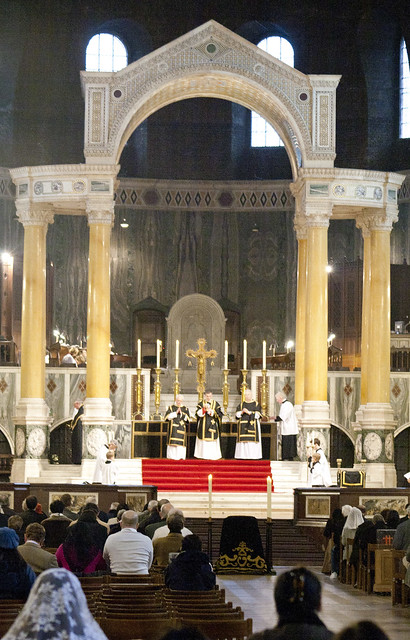 |
| Bishop John Arnold celebrating the Requiem in 2014 |
Seasonal offerings in the LMS Shop
Now available is the famous Latin Mass Society Ordo, which has all the feasts of England and Wales as well as the Universal Calendar;
Our indispensible Wall Calendar with its unique design to give you more space to write things into the dates and lots of photos;
Christmas cards with four different classical paintings of the Nativity and a proper seasonal greeting inside.
Get yours now!
Support the work of the LMS by becoming an 'Anniversary Supporter'.
The Dominican Rite for the Latin Mass Society in Oxford
Yesterday was the annual LMS Pilgrimage to Oxford in honour of the city's Catholic martyrs. This year we visited the site of the martyrdom of Bl George Napier, the Castle Gallows, where he had his eternal nativity in 1610, after many years of ministering as a priest in his native Oxford, and the surrounding area.
The LMS has for a number of years had this pilgrimage at the Oxford Blackfriars, celebrated by the friars in their own Rite, the ancient Dominican Rite. It is a lot like the ancient Roman Rite, but there are a number of differences which are interesting to see, and it has an austere elegance all of its own.
The Schola Abelis, Oxford Gregorian Chant choir which exists to support celebrations of the traditional liturgy, accompanied the Mass as usual, with Dominican Chant. Just as the rubrics of the Mass are a little (actually, quite a bit) different from the Roman ones, so the chant melodies and the whole feel of the chant is a bit different.
It was an entirely chant Mass, with a Dominican Chant Mass Ordinary to go with the propers.
The changable weather and 'storm Brian' may have contributed to a lower than usual turnout, but the Schola Abelis had the biggest group I think we have ever fielded at a service: fifteen.
A sudden downpour during the procession added to the interest of the occasion, as did our being joined by one of Oxford's ... characters. I'd not normally encourage someone to carry a processional statue while holding in one hand a half-drunk bottle of wine, but he was very attached to the idea and it seemed a pity to discourage him. He assisted at Benediction as well.
The public witness of the procession, and the liturgy, meant something to him. These things have a power which we cannot fully articulate or perceive. The saints in prison managed without the liturgy by a special grace but for the rest of us it is necessary. It is the normal and indispensible food for the soul, to sustain us and to help us grow in the faith.
I know for many Catholics for the last half-century the liturgy has been a trial, a source of suffering. It is no small thing to contribute to a liturgy which is an occasion of light and consolation. The value of the Traditional Mass, in whatever Rite it may be, and the other traditional liturgical acts and devotions, cannot be calculated. Don't allow yourself to miss out on what should be a Catholic's birthright.
Support the work of the LMS by becoming an 'Anniversary Supporter'.
More on Pope Francis and doctrinal development
I've been included in a panel of academics interviewed for LifeSiteNews on the subject of doctrinal development, in light of Pope Francis' remarks on the Death Penalty.
An extract:
Shaw said so-called “conservative” Catholics would be especially susceptible to a change in Catholic teaching on capital punishment.
“Pope St John Paul II was clearly personally opposed to capital punishment and campaigned for its abolition. While he was careful never to claim that the teaching of the Church ruled capital punishment out, his views have become strongly associated with the Catholic Church and have influenced many conservative Catholics,” he said.
“It may seem a relatively small step between what Pope St John Paul II claimed – that capital punishment was not wise or appropriate in the conditions of the modern world – and what Pope Francis is now claiming – that capital punishment is never ‘admissible,’ and that Catholics living in very different conditions from our own were wrong to make recourse to it.”
“However, it is obviously a huge step to say that the Church herself was wrong in her consistent teaching, which has always been that capital punishment can be legitimate,” he added.
Read the whole thing there.
Support the work of the LMS by becoming an 'Anniversary Supporter'.
A friendly warning to Opus Dei
 I don't want to single out Opus Dei; what I have to say is applicable to a number of conservative Catholic organisations. But Opus Dei does rather single out itself.
I don't want to single out Opus Dei; what I have to say is applicable to a number of conservative Catholic organisations. But Opus Dei does rather single out itself.
We had the organisations 'number 2', the Vicar General, Mgr Mariano Fazio, criticising the Filial Correction for 'correcting a father in public':
Any faithful, bishop, cardinal, lay person has the right to tell the pope what he sees fit for the good of the Church. But it seems to me that he has no right to do so publicly and to scandalize the whole Church with these manifestations of disunity.
A number of innovations of a doctrinal nature are to be found in the documents of the Second Vatican Council: on the sacramental nature of the episcopate, on episcopal collegiality, on religious freedom, etc. These innovations in matters concerning faith or morals, not proposed with a definitive act, still require religious submission of intellect and will, even though some of them were and still are the object of controversy with regard to their continuity with earlier magisterial teaching, or their compatibility with the tradition. In the face of such difficulties in understanding the continuity of certain Conciliar Teachings with the tradition, the Catholic attitude, having taken into account the unity of the Magisterium, is to seek a unitive interpretation in which the texts of the Second Vatican Council and the preceding Magisterial documents illuminate each other. Not only should the Second Vatican Council be interpreted in the light of previous Magisterial documents, but also some of these earlier magisterial documents can be understood better in the light of the Second Vatican Council. This is nothing new in the history of the Church. It should be remembered, for example, that the meaning of important concepts adopted in the First Council of Nicaea in the formulation of the Trinitarian and Christological faith (hypóstasis, ousía), were greatly clarified by later Councils.
The problems with this paragraph are many, and I don't want to give his article a detailed critique, so to keep it brief I invite the reader to answer for him or herself the following two questions:
1. Given that Council documents and other official documents contain both statements of the Ordinary Magisterium and other kinds of proposition, such as historical and scientific claims (such as are not inseparably connected with teaching), prudential judgements, and theological speculations, would the loyal Catholic not need to apply his mind first to determining what was actually magisterial in a document before submitting intellect and will to it?
Anyone who thinks that the non-magisterial content of one official document cannot contradict that of another simply needs to read a few. The mutually-contradictory Papal Bulls of the Franciscan property debate would be one place to start.
2. When the meaning of putatively magisterial statements in Council or other official documents are disputed, and where such disputes are themselves legitimate, how is it possible to submit one's intellect and will to them? How can one submit one's intellect to a statement whose meaning one cannot determine?
What seems reasonably clear is that the top two officials of Opus Dei are inviting Catholics to adopt an attitude of pre-emptive intellectual submission towards anything emanating from Rome, without making use of the right - which can also be a duty - to inform our fellow Catholics of their concerns about such emanations. Yes, they say, there can be ambiguities and problems, but obedience of the intellect comes first, acceptance come first, and attempts to smooth over the problems can follow later.
I've been told in comments on this blog, what I already knew, which is that Opus Dei contains many Good People. Of course it does. These are, in fact, among the most good-hearted and faithful Catholics whom one could hope to meet. It is through no lack of charity towards them that I write as a I do: quite the contrary. While I know that what I write will have no effect at all on the leadership of the organisation, I want to warn those who are members, and those associated with the many other organisations which include what we call 'conservative' Catholics, of the dangers of the road you are going down, when you start thinking of obedience as the chief or even the only virtue, instead of humility, justice, courage, charity, and the virtue of faith itself.
One danger, which follows obviously from what I have just said, is a spiritual distortion arising from a failure to recognise and cultivate the full set of virtues. That is something readers will just have to meditate upon. I want to focus on two other dangers.
The first is that it leads into anti-intellectualism. Perhaps this doesn't look like a big deal, but it will destroy the intellectual prestige of your communities and drive out those of your members of an intellectual bent. People with an intellectual formation who are honest will not be able to stick it: it will drive them nuts.
The second problem derives from the fact that when the wind changes direction, the internal policy will follow also. This isn't some uncharitable speculation on my part, it is exactly what Mgr Ocariz is saying. A new Pope, a new policy, and a new document, and all the 'faithful Catholics' who follow his advice will be reading the 'innovation' back into previous documents, submitting their intellects, and tying themselves into knots to say that what they'd previously said was black is actually, now you come to look at it, white. You may think we'll have to wait for a new Pope to see this happening, but no, we can see it happening with the current Pope.
It is a fact, and not a particularly disturbing one in itself, that Papal policy changes. Again, anyone doubting this just needs to do some reading, but a nice example is the maddening succession of policy reversals the Popes made towards the 'Chinese Rites'. Now it may be that such changes of policy require obedience on the basis of the disciplinary authority of the Pope, but anyone living through a period such as that who tries to justify each policy as correct, as in continuity with previous rules, and as based on fundamental magisterial principles, because he does not want to admit that official documents should ever be disagreed with, has got a problem.
He has got, in fact, the problem that the British Communist Party had in and just before the the Second World War. First the Party Line was that the Nazis were evil, as they were persecuting communists in Germany. Then the Party Line was to be neutral in the war against Germany, since the Soviet Union was allied to the Nazis. And then the Party Line was to support the war with Germany, since the Soviet Union was at war with them itself. Each had to be passed off as eternally true for fundamental ideological reasons.
Although in France and Italy the Communists were able to retrieve some self-respect by their resistence to occupation, in Britain the flip-flopping did irreparable damage to the Party's credibility. The same thing is going to happen to any organisation which claims to base itself on objective principles which does repeated 'backflips', to use Cardinal Pell's phrase. To put it bluntly, this will destroy your community.
Am I applying this to Opus Dei? Let me correct that impression. Really, what I have been saying applies to the Catholic Church as a whole over the last half-century. We have all seen it: good-hearted and loyal people twisting themselves into pretzels to make everything seem ok, but other Catholic intellectuals just dropping out of the whole game because it looks incompatible with intellectual self-respect. And yet others, observing all this, concluding that the Church doesn't really stand for anything much any more.
That's a lesson we should learn from. If we don't, we are going to repeat it till we do.
Support the work of the LMS by becoming an 'Anniversary Supporter'.
‘Pro-Pope Francis’ petition launched
V. Let us pray for our holy Father the Pope.
R. The Lord preserve him, and give him life, and make him blessed upon earth, and deliver him not up to the will of his enemies.
Let us pray.
O Almighty and eternal God, have mercy on thy servant Francis, our Pope, and direct him according to thy clemency into the way of everlasting salvation; that he may desire by thy grace those things which are pleasing to thee, and perform them with all his strength. Through Christ our Lord.
R. Amen.
See also the LifeSiteNews report.
Oxford Pilgrimage this Saturday
This Saturday, 21st October, the annual Latin Mass Society Pilgrimage to Oxford will take place.
11am High Mass in the Dominican Rite, Blackfriars, in St Giles, Oxford
2pm Procession to the Castle Gallows, site of the martyrdom of Bl George Napier in 1610
3pm Benediction in Blackfriars
Support the work of the LMS by becoming an 'Anniversary Supporter'.



